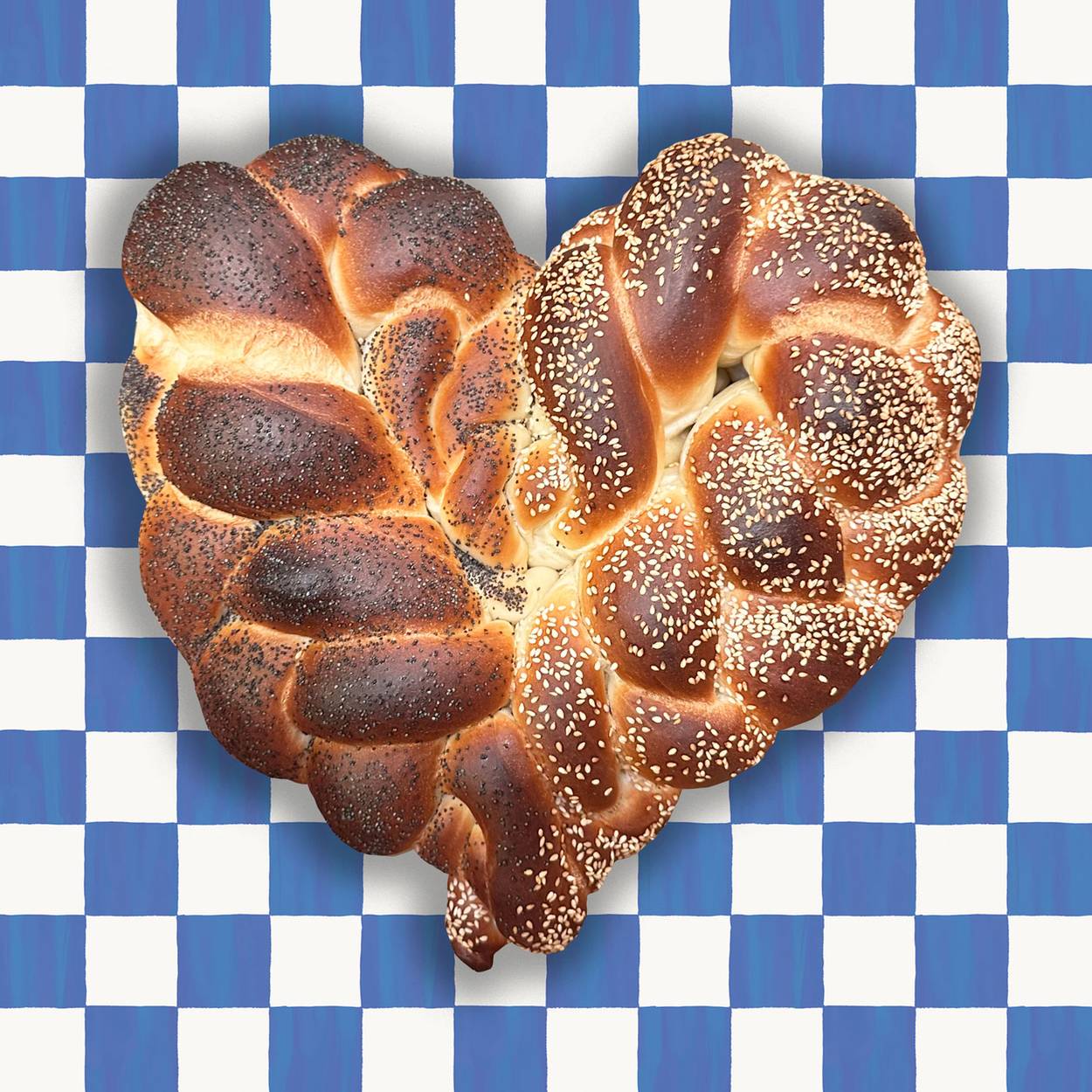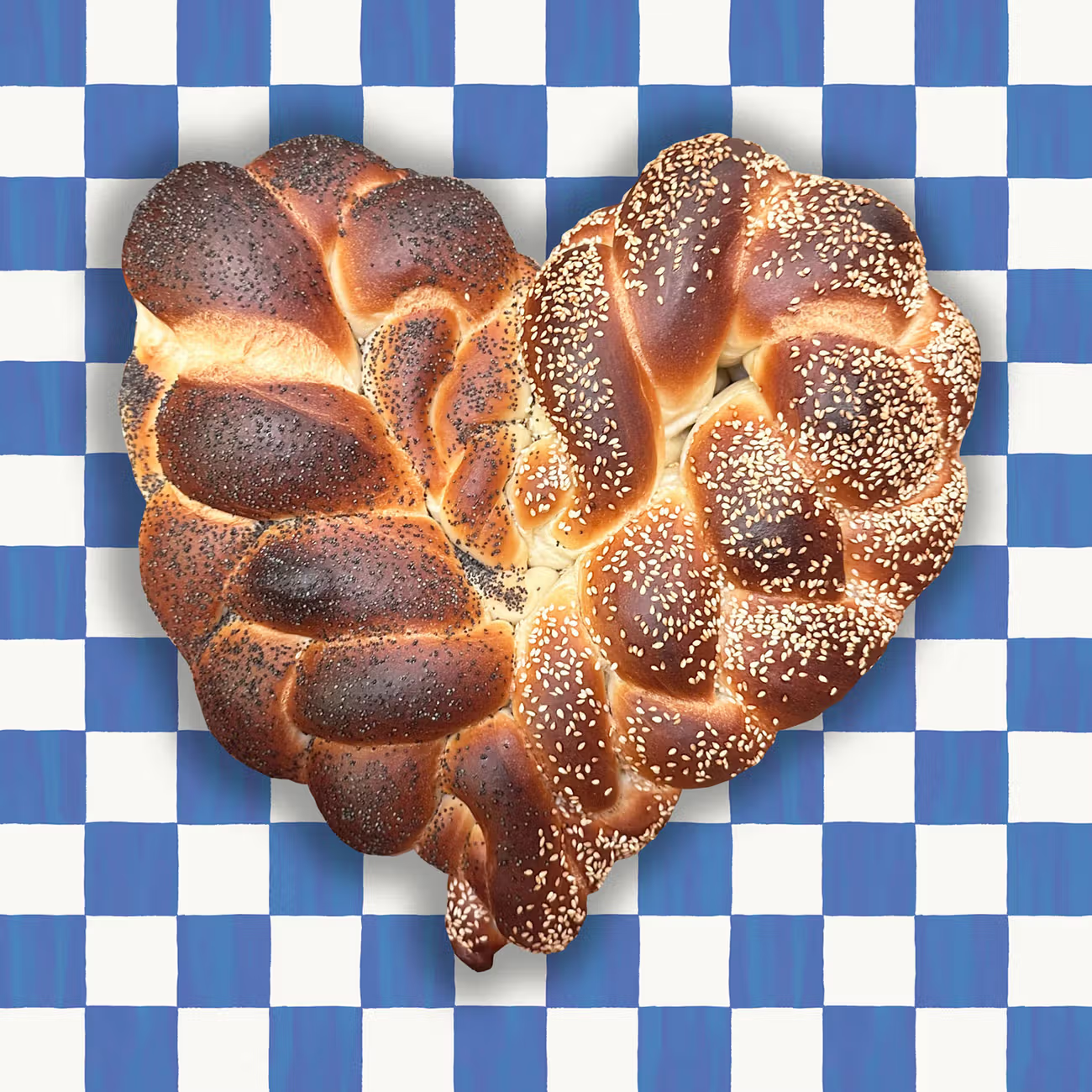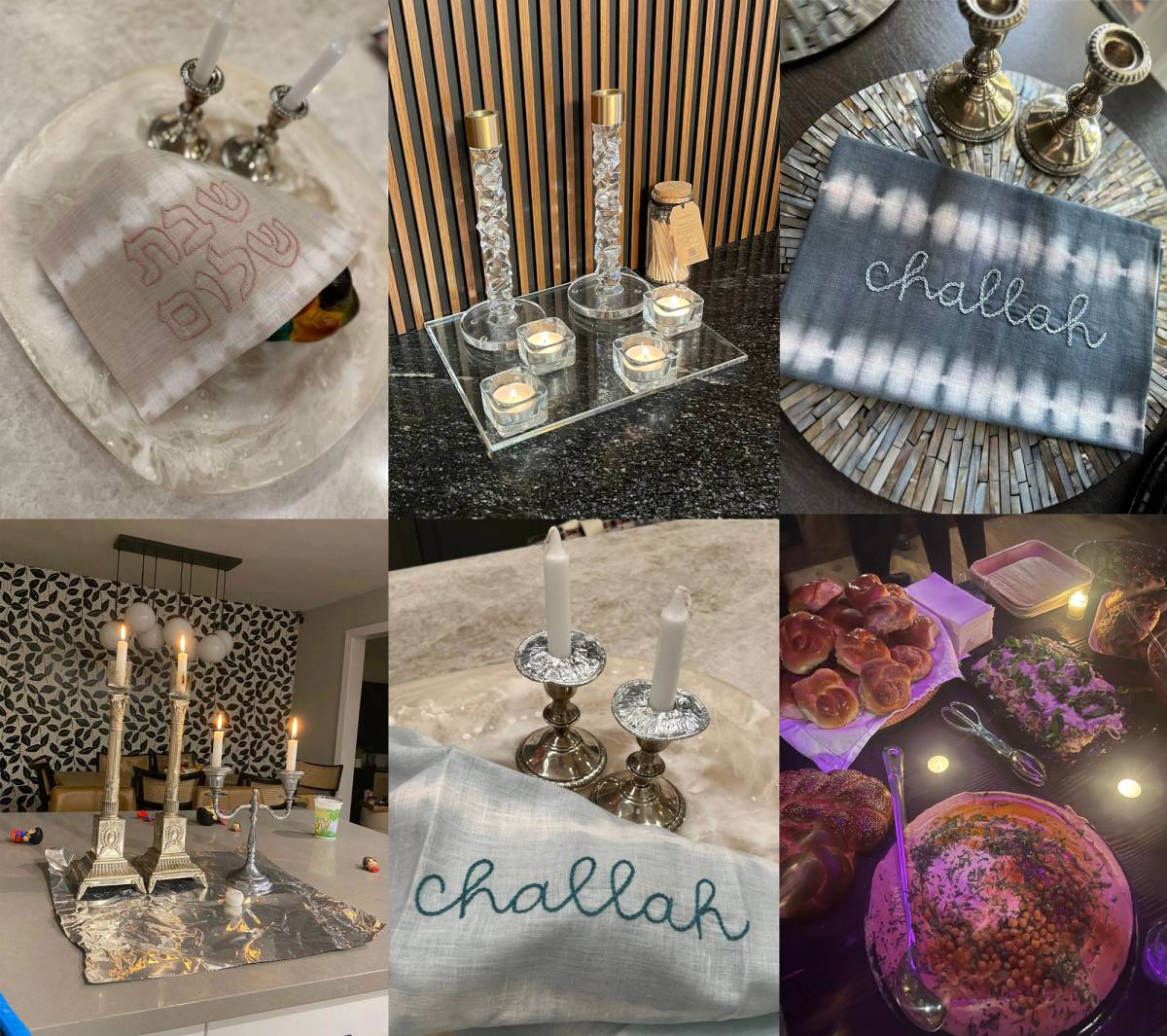Finding the Joy in Shabbat
In difficult times, Jews are finding comfort in familiar things: challah, candles, and Friday night dinner

Courtesy Breads Bakery

Courtesy Breads Bakery

Courtesy Breads Bakery

Courtesy Breads Bakery
It all started with a photo. It was Friday, Oct. 13, and while I was doom-scrolling on Instagram to distract my mind from the news, I stumbled across a photo of a Shabbat dinner table. It was set so beautifully. This is how I wish my Shabbat dinner table could look, I thought to myself. The challah was golden. The wine was corked. The tablecloth was crisp white. The calla lilies stood perfectly in their vases. The children’s plates and sippy cups looked just like ours. Everything on this perfectly crafted table sat untouched. And that’s when I realized that no one would be eating Shabbat dinner at this table. It was set to honor the 200+ hostages taken by Hamas on Oct. 7. On the back of each chair was the name and photo of one hostage. My eyes filled with tears, understanding that these hostages don’t get to have Shabbat dinner with their families.
But we do.
That’s when my mindset shifted. I love Shabbat dinner. And as a busy working mother of two toddlers, it’s work, sometimes hard work. But when we put in that work, it’s so worth it. We feel fulfilled as a family. My kids proudly reveal the challah they baked in school that day. They fight over who gets to help set the table. My daughter compliments my food. Sometimes I thank her profusely, and sometimes during weeks when I was extra busy, I pretend that I did indeed cook the food, even if I ordered it. We have Shabbat dinner a lot—but not all the time.
After seeing the photo of the empty table set for the hostages, I understood how much we needed Shabbat dinner right now. I understood what a sense of joy it brings to our family, especially during this time of extreme sadness, anger, and grief we’re feeling. And now, during one of the most depressing times I’ve ever had as a Jewish mother, I’m trying my hardest to give some sense of Jewish joy to my children.
I noticed that others felt the same. When I switched from doom-scrolling to joy-searching, I was shocked to see how much people were turning to Shabbat for a sense of joy. I saw celebrities posting challah pics. I saw friends who I knew were Jewish, but never did Jewish things, posting their Shabbat candles. Multiple invitations to challah bakes popped up in my inbox. Local restaurants began hosting Shabbat dinner on Friday nights. Acquaintances I’ve met once or twice were inviting us over for Shabbat dinner. I even spoke with a friend and colleague at OneTable, a national nonprofit (where I consult as a researcher) that empowers people to find, share, and enjoy Shabbat dinners, who said that since Oct. 7, OneTable participation has risen 45% across the country. The rituals and traditions of Shabbat were bringing people back to life, giving us a sense of comfort.
I found myself rushing to create Shabbat dinner for my family that first Friday after Oct. 7—and every Friday since. It seemed like everywhere I looked, I saw Shabbat candles, challah, beautiful Shabbat dinners, and more. It warmed my heart and made me smile more than I had since learning about the tragedies and ongoing conflict. When I saw that I wasn’t alone in my yearning for Shabbat, I began speaking with others to understand their experiences.
In my Instagram feed, it seemed as if my friends, as well as total strangers, were lighting Shabbat candles more than ever before. In a Facebook group I met a woman named Michellanne, from Maryland, who had owned Shabbat candles for over a decade but never used them. On Friday, Oct. 13, she decided to take them out and light candles with her toddler daughter for the first time since she left her house for college. “Lighting Shabbat candles felt like a way to engage with Judaism that’s very joyful at a time it feels very scary to be Jewish right now,” she told me. Although she doesn’t always have the capacity to make a Shabbat dinner, she finds lighting candles to be an accessible and fun observance she can do with her toddler. “I think a lot about passing on Jewish identity to the next generation. And after so much death, I wanted to double down on a way to impart this on my daughter that feels simple and joyful. It feels extra important at this moment.”
Then I began seeing restaurants and social entrepreneurs hosting Shabbat dinners. Joel Tietolman, who owns Mile End Delicatessen in Brooklyn, always had it in the back of his mind to host Shabbat dinners at his restaurant, but for one reason or another never made it happen until Oct. 13, the first Shabbat after the recent massacre. “Mile End Deli was always about comfort food, and matzo ball soup goes well beyond just Jewish life,” Tietolman said. “Anyone who needs comfort can come to us, and it’s important for customers to feel like they can escape their lives by having some deli.” Tietolman saw other businesses holding fundraisers, and while he admired their efforts, he felt Shabbat dinner was the right approach for his business.
Every Friday evening, Mile End Deli has a Shabbat dinner menu of matzo ball soup, brisket, babka, and more. “People are seeking a way to identify with their Judaism right now, and we can help them do that through food,” he said. Tietolman has seen people come in with their own candles and wine, as well as those bringing their friends who aren’t Jewish. “Having Shabbat dinner at our deli is a way to take a moment and say we’re Jewish, we’re proud, and we’re here. It’s an opportunity for some semblance of Jewish life because if we don’t give ourselves light, darkness wins.”
When there’s so much pain and injustice, we feel helpless, but we all want to do something. For us, it made sense that the answer would come from challah.
Jacqueline Lobel, founder of Shtick, a Jewish New York company that hosts collaborations, pop-ups, parties, and Shabbat dinners, didn’t originally have a Shabbat dinner planned for Oct. 13. But she decided that she had to put one together. “On the morning of Oct. 9, I got a DM from someone saying people could really use community right now, and asked if I was going to host a Shabbat dinner that Friday,” Lobel said. “And I thought, ‘Yes, of course, that’s what we all need right now,’ and this spontaneous Shabbat dinner for over 200 people took off in less than three days.” Lobel was overwhelmed by the outpouring of support she received from others who wanted to join in community. “We had a collective of 30 people cooking, along with a full bar staff of volunteers and donations. I spent the entire day on Friday just receiving donations.”
During normal times, Lobel usually has months to plan her events. This time was different. With only days to plan, she wasn’t sure how it would play out. “There was an intensity at the beginning of the night because it was one of the first times people were among other Jews since Oct. 7,” she said. “We said Kaddish for the people who were killed and we had a rabbi lead us in prayers. And then there was a massive release and a beautiful communal embrace. The energy lit up when we broke bread and celebrated being together.”
Much of that togetherness might be achieved on any night, simply getting together for dinner. Shabbat is “a little extra,” Lobel said. “Shabbat is the time of the week when we eat our best foods—I don’t make brisket on a Tuesday!”
“On a deeper level, Shtick has become my way of combating antisemitism without having to say antisemitism,” Lobel said. “I’m trying to create something that reflects our modern life but that’s also rooted in tradition—and I feel it’s important that we don’t dim our light because we’re afraid or because it’s not cool.”
I spoke with a woman named Alexis, who lives in San Francisco, and hosted her first OneTable dinner on Oct. 20. While she’s been to other Shabbat dinners and knew OneTable was a resource, she had never hosted before. “What made me want to host Shabbat dinner was how much my friends and I have been craving Jewish community throughout all of this. Most of us are feeling so many different emotions, and we just want to be together right now,” she said. Alexis brought together 15 friends and acquaintances over Shabbat dinner, and though she expected it to be a somewhat somber evening, she was surprised by the level of happiness it gave people. “There was something about just being together and knowing we all felt similar emotions that made it more permissible to just be happy,” she said. “It felt like we were specifically standing up and being joyful as an act of rebellion.”
All around me, over the past few Fridays, I see challah. People are baking challah at home and at community challah bakes and buying it en masse at bakeries. I found myself trying to find the coveted heart-shaped challah from Breads Bakery. And even though I already have a beautiful challah cover, I bought new ones for each of my children. I stumbled upon these hand-dyed, hand-embroidered challah covers from Whigstock Studio. Had I never seen these before or were they brand new, I wondered. Rachel Geller, the company’s founder, has made Judaica on request in the past, but she never really mass-marketed them before. “In the aftermath of the horrific events of Oct. 7, I was looking for a way to give back while also bringing peace into our homes,” Geller said. She has received overwhelming interest in her challah covers and donates the proceeds from their sales to charities helping the victims. “The challah cover is a symbol that unifies Jews of every denomination,” she said. “Blessing the challah on Shabbat can offer us a purposeful pause in these turbulent times and connects us all in peace and love.”
It seemed as if—more than ever—challah was everywhere. Jack Hazan, a licensed psychotherapist, baker, and author of Mind over Batter: 75 Recipes for Baking as Therapy calls it “community through carbs.” Over the past few weeks, Hazan has hosted challah bakes and Jewish “baking through grief” workshops for hundreds of participants. “It’s amazing how therapeutic baking can be. It channels energy from negativity and heaviness to something delicious,” he said.

Images courtesy: Whigstock Studio; Jacqueline Lobel; The Levi family; The Domanski family
Why challah? “Some people want to turn to something that reminds them that they’re Jewish right now,” he said. “Challah connects us to what our ancestors did. When we eat it, we’re celebrating being Jewish at a time when it seems like the world is trying to rob us of that.” While many are buying challah, the recent trend of baking it seems more and more prevalent. “In recent hard times like the COVID pandemic, baking bread has become something we do,” Hazan said. “The process of kneading, braiding, and baking challah gives your hands and mind something to do instead of sitting around and doom-scrolling.”
As a therapist, Hazan wants people to understand that there are many different ways to grieve, and he recommends baking to many clients: “Yes, we should mourn and pray, but why not turn to joy and creation?” Hazan understands firsthand how scary it feels to be Jewish right now. He is well versed in the anger and negativity many people feel as a result of the conflict. At the same time, he suggests that patients—and anyone who will listen—tap into the joy of being Jewish. “I encourage everyone not to be brought down by the negativity, and to turn to something inside of you that helps you rise above and celebrate being Jewish right now.”
I never did get my hands on the heart-shaped challah made by Breads Bakery, but I did get a chance to sit down and speak to Gadi Peleg, the company’s founder and owner. Breads is known for many things—their decadent babkas, their rich rugelach, and their innovative challah. Although I’m sure people turned to the many baked goods Breads Bakery sells, it seemed to be their challah—and specifically their heart-shaped challah—that people wanted most in recent weeks.
In the years of running his bakeries, Peleg has learned that for many of his customers, the traditions of Shabbat and challah bring them back to the familiar parts of their childhood. “I knew that after these tragedies happened, our ability to help would come through bread,” Peleg said. “For many people, bread is basic and bread is comfort. And when horrible events happen, we need to turn to the basics and seek comfort.”
Peleg received a call from his friend, BenGingi, a food influencer, saying he wanted to collaborate, do something to make people feel joy, and give back (100% of the proceeds from the sales of the heart-shaped challahs went to support Magen David Adom). “We had just witnessed acts of pure evil, so we wanted to send a message of love and hope. We came up with the idea for a heart-shaped challah,” Peleg said. At first, Breads was making hundreds of heart-shaped challahs a day, and for the first few days they would sell out by 8 a.m. Even as they produced more, they could barely make enough to make it past noon. Through all of this, they saw a huge increase in their other challah sales as well.
For now, sales of the heart-shaped challah have paused so they can figure out the next iteration. More is coming, Peleg promised. “When there’s so much pain and injustice, we feel helpless, but we all want to do something,” he said. “For us, it made sense that the answer would come from challah.”
I’m still haunted by that photo of the empty Shabbat dinner table. And these days, more than ever before, I usually feel exhausted and depleted by Friday. But I love seeing others find their joy through Shabbat traditions during these dark times, and I’m excited by witnessing all the new rituals being created. I remind myself that while I certainly don’t have to spend the time and energy making Shabbat dinner, I get to have Shabbat dinner with my family—and that’s one of the biggest blessings I could have right now.
Become a member of Tablet Magazine
Jamie Betesh Carter is a researcher, writer, and mother living in Brooklyn.